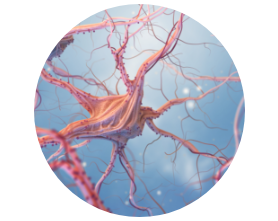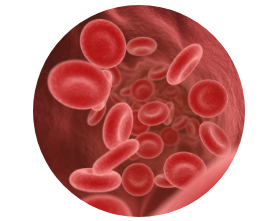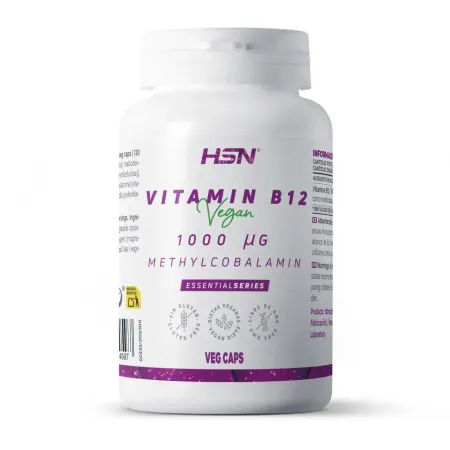Buy our vitamin B12 supplements in softgels or capsules, perfect for people who follow a vegan diet. Methylcobalamin or cyanocobalamin formats:
-
HSN -
-
-
-
-
-
-
-
-
-
-
Buy our vitamin B12 supplements in softgels or capsules, perfect for people who follow a vegan diet. Methylcobalamin or cyanocobalamin formats:
Vitamin B12 or cobalamin is essential for the body, and B12 supplements can help you get the nutritional intake you need. Find the best-quality vitamin B12 to buy online at HSN and discover all the benefits it can bring to your health.
Choose between B12 Methylcobalamin and Cyanocobalamin 1,000 mcg by EssentialSeries, in a range of sizes, two essential b group vitamins for those who follow a vegan diet.
Table of contents
Our body needs vitamin B12, but some people may be deficient in this nutrient, for example, because they follow a vegan diet or do not consume enough animal foods, although there are other causes.
Do you know what B12 is and what role it plays in your body? In this article, we will explain what benefits this vitamin brings, and how a product rich in this nutrient can help you:

B12, or cobalamin, is one of the eight vitamins belonging to the B group.
It's a water-soluble vitamin and is absorbed through foods of animal origin consumed in the diet, although it can also be incorporated through food supplements or fortified products. This option is essential for vegans, and can be added to any other supplement you take in your diet.

Contribution to neurological and psychological function.

Normal function of the immune system.

Cell division.

Reduction of tiredness and fatigue.
And some of the benefits it brings are as follows:

It contributes to the normal function of the nervous system.

It supports normal red blood cell formation.

It contributes to normal homocysteine metabolism.

It contributes to normal energy metabolism.

It contributes to normal psychological function.

It is involved in the process of cell division.
The different options of easy-to-take capsules that we offer at HSN will ensure you get the optimal dose of B12, whether you follow a vegan diet or not, but with the commitment to offer the best product.
In the nutritional info tab on our website or on the label of each supplement, you can find detailed information on how to use the product or the NRV (Nutrient Reference Values) per serving or daily dose. Likewise, we recommend following the indications given by specialists in each case.

At HSN, you have a wide selection of vitamin B12 to choose from, alongside other vitamins and minerals – always at the best price and with the highest quality.
Our preparations come with all the guarantees, both in terms of the manufacturing process and in the selection of raw materials. Discover the wide range of products we offer and choose the supplement that best suits your nutritional needs.

If you have a vitamin B12 deficiency, HSN recommends that you add this supplement to your daily diet, so that your body can benefit from all the functions performed by this vitamin:

VITAMIN B12 (METHYLCOBALAMIN) 1000mcg
The vitamin B12 level is measured by clinical examination by blood sampling. Healthy values are set between 150 and 400 pmol/L.
Levels below 150pmol/L are a clear sign of deficiency.
The daily nutritional requirements of B12 recommended by health authorities are:
Although it can take a long time to detect low B12 levels, you should not ignore some of the symptoms that can occur in case of deficiency:
Consult your doctor or a specialist about any of these symptoms so that they can give you the best recommendations according to your particular situation and indicate how and when you should take this vitamin, whether it's prescribed or not.
Its deficiency can lead to a disease called pernicious anaemia; a lack of healthy red blood cells in the body.
Unfortunately, it can take years for symptoms of vitamin B12 deficiency to appear in your body, so diagnosis can be complicated and can only be detected through blood tests.
This vitamin is also excreted in the urine, although not quickly; hence it is often stored in the liver or kidney.
As we age, our body finds it increasingly difficult to absorb the cobalamin we eat through food. As such, people of middle-age should take extra special care of their B12 levels.
People who suffer from pernicious anaemia also have difficulties in absorbing cobalamin. In such cases, specialists normally inject patients with vitamin B12 to increase levels in the body.
Those following vegan diets may also suffer deficits, as the natural sources of B12 are meat, fish, eggs, milk and dairy products.
Vegetarians can also have difficulty meeting their recommended daily intake if their diet doesn't include sufficient dairy products.
In all these cases, an intake of dietary supplements rich in B12, as well as foods fortified with B12, is essential. The aim is to meet the nutritional requirements of a vitamin that's essential for our body.
Intrinsic factor is the body’s key protein for absorbing vitamin b12 from food because it allows the cobalamin molecule to pass through the wall of the small intestine.
This step can only be performed using a “transport medium”, which is the protein called intrinsic factor.
An excess of B12 can also be detrimental to health, as the accumulation of vitamin B12 can cause adverse effects in the body.
Some of the symptoms include anxiety and and fast heart rate, stomach pain, blurred vision, and muscle aches.
Although cobalamin is a substance with few side effects in healthy people, you should always follow the guidance of specialists so that they can analyse your data at an individual level.
The body naturally absorbs B12 in foods of animal origin, including:
Vegetables don't contain any vitamin B12 unless they're fortified, as is the case with some fortified yeasts and cereals.
As such, it is essential for those who don’t consume enough animal products to take dietary supplements to ensure optimal levels of B12.
Cobalamin or B12 is found in foods of animal origin, and it's absorbed when consumed in the diet.
To ensure normal B12 levels, B12 should be supplied daily, although in the case of vegans this should be through supplementation or certain foods fortified with the vitamin.
This is because vegan diets do not contain cobalamin, as they do not consume any foods of animal origin, including eggs and dairy products. The same can happen in vegetarian diets that do not provide enough vitamin B12.
The bioavailable forms of B12 in supplements are cyanocobalamin or methylcobalamin, both of which can be used to meet the body's nutritional requirements.

Specialist in Research, Development and Product Innovation. His passion for innovation and continuous improvement ensures that every product developed is of the highest quality and effectiveness.